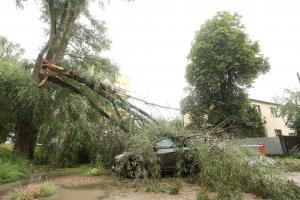
The Role of Environmental Factors in Louisiana Car Accidents: Legal and Safety Concerns
Stephen M. Morrow, a lawyer at Morrow Law Firm in Opelousas, Louisiana, highlights the importance of recognizing the role that environmental factors play in vehicle accidents across the state. Led by William P. Morrow, John Michael Morrow, Jr., and Stephen M. Morrow, the firm has worked with numerous cases where hazardous conditions stemming from the environment have become a central issue in determining liability and ensuring that victims receive fair compensation.
Environmental Conditions Affecting Louisiana Drivers
Louisiana's geographical landscape is characterized by its proximity to the Gulf of Mexico, extensive wetlands, and a network of rivers. While these features contribute to the state's natural beauty, they also pose significant risks for drivers. Coastal erosion, a prominent issue in Louisiana, often results in road damage and instability, making it more difficult for vehicles to navigate safely.
In addition, the state is prone to frequent flooding, which can quickly transform roads into dangerous, waterlogged pathways. Floodwaters can obscure road markings, cover potholes, or hide debris, leading to accidents involving collisions, hydroplaning, and vehicles losing control. Even after the waters recede, the resulting damage to roads can leave lasting hazards for drivers, including weakened pavement or uneven surfaces.
Stephen M. Morrow notes, "Heavy rain, hurricanes, and tropical storms are also common in Louisiana, creating unpredictable and dangerous driving conditions. Slick roads, limited visibility, and debris from high winds can contribute to accidents, especially when drivers are unprepared for the rapidly changing conditions."
Coastal Erosion and Road Instability
Coastal erosion is a well-documented problem in Louisiana, with the state losing significant portions of its coastline each year. The gradual erosion of land near coastal roads can undermine the structural integrity of the roadways themselves, leading to cracks, sinkholes, or even sudden collapses. Drivers who encounter unstable or poorly maintained roads due to erosion may be at greater risk of accidents, especially when these conditions are exacerbated by heavy rain or flooding.
Coastal erosion can also contribute to the narrowing of roads or the disappearance of crucial evacuation routes, particularly during hurricane season. As the land erodes, the space available for vehicles to safely travel becomes limited, increasing the likelihood of accidents in areas where drivers must navigate congested or compromised roads.
When an accident occurs due to road conditions affected by coastal erosion, determining liability can be challenging. In some cases, the responsibility may fall on government entities or agencies tasked with maintaining the safety of public roads. In other instances, drivers may be held accountable if they failed to take appropriate precautions or adjust their driving behavior to suit the conditions. Navigating these legal complexities requires a thorough understanding of the impact of coastal erosion on the state’s infrastructure.
Flooding and Hydroplaning
Flooding is one of the most common environmental factors leading to car accidents in Louisiana. Heavy rainfall can overwhelm drainage systems, causing water to pool on road surfaces, particularly in low-lying areas. Drivers may find it difficult to judge the depth of standing water, leading to accidents caused by hydroplaning, where a vehicle’s tires lose traction on the wet surface and cause the driver to lose control.
In cases of hydroplaning, the speed at which the vehicle was traveling and the condition of the tires can be significant factors in determining liability. Poorly maintained tires or excessive speeding during wet conditions can increase the risk of an accident, and these details are often scrutinized in accident claims involving hydroplaning.
Floodwaters can also carry debris, which can cause sudden damage to vehicles, such as tire blowouts or damage to the undercarriage. Accidents caused by flooding often involve a combination of factors, including driver error, environmental hazards, and inadequate road maintenance. Legal claims in these situations can become complicated as different parties may bear partial responsibility for the conditions leading to the accident.
Legal Considerations for Environmental Accidents
Accidents caused by environmental factors in Louisiana present unique legal challenges. One key issue is determining the extent to which the environmental condition itself contributed to the accident versus the actions of the driver. Louisiana follows a comparative negligence system, which means that liability can be divided between multiple parties based on their level of fault. For example, if a driver failed to slow down in wet conditions and hydroplaned into another vehicle, that driver may be found partially liable for the accident, even if flooding played a role.
In cases where poor road maintenance contributed to an accident, government agencies responsible for maintaining the roads may also be held accountable. Filing claims against a government entity, however, involves specific procedures and deadlines, which must be adhered to in order to pursue compensation.
Accidents caused by environmental factors can also involve insurance complications. Insurance companies may argue that severe weather or road conditions are considered “acts of nature” and thus not fully covered under certain policies. Understanding how to navigate these disputes is critical for accident victims seeking full compensation for their injuries and property damage.
Mitigating Environmental Risks
While Louisiana’s environment presents unavoidable challenges for drivers, there are steps that can be taken to reduce the risks associated with these conditions. Drivers should stay informed about weather conditions, particularly during hurricane season, and avoid unnecessary travel when storms or flooding are expected. Maintaining vehicles in good working order, including ensuring that tires have adequate tread and are properly inflated, can help minimize the risk of accidents caused by hydroplaning or road damage.
In addition, government agencies and local authorities must prioritize infrastructure maintenance in areas prone to flooding or erosion. Regular inspections and timely repairs to roads can help mitigate the effects of environmental conditions and reduce the likelihood of accidents.
Conclusion
Louisiana’s unique environmental factors, including coastal erosion and flooding, create significant risks for drivers and complicate the legal landscape surrounding car accident claims. Understanding how these environmental conditions contribute to accidents is essential for determining liability and ensuring that victims receive the compensation they are entitled to. Legal professionals familiar with the impact of environmental hazards on road safety play an important role in helping clients navigate these complex cases, addressing the challenges posed by Louisiana’s unpredictable environment.
Morgan Thomas
Rhino Digital, LLC
+1 504-875-5036
email us here
Visit us on social media:
Facebook
Distribution channels: Culture, Society & Lifestyle, Insurance Industry, Law
Legal Disclaimer:
EIN Presswire provides this news content "as is" without warranty of any kind. We do not accept any responsibility or liability for the accuracy, content, images, videos, licenses, completeness, legality, or reliability of the information contained in this article. If you have any complaints or copyright issues related to this article, kindly contact the author above.
Submit your press release

